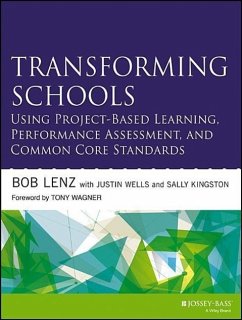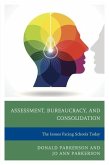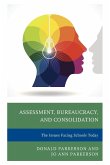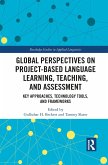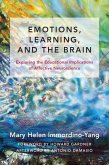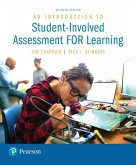Bob Lenz, Justin Wells, Sally Kingston
Transforming Schools Using Project-Based Learning, Performance Assessment, and Common Core Standards
23,99 €
inkl. MwSt.
Versandfertig in über 4 Wochen

12 °P sammeln
Bob Lenz, Justin Wells, Sally Kingston
Transforming Schools Using Project-Based Learning, Performance Assessment, and Common Core Standards
- Broschiertes Buch
- Merkliste
- Auf die Merkliste
- Bewerten Bewerten
- Teilen
- Produkt teilen
- Produkterinnerung
- Produkterinnerung
Shows how the concept of deeper learning can meet the need for students who are both college and career ready and engaged in their own education. This book explains how project-based learning can blend with Common Core-aligned performance assessment for deeper learning.
Andere Kunden interessierten sich auch für
![Assessment, Bureaucracy, and Consolidation Assessment, Bureaucracy, and Consolidation]() Donald ParkersonAssessment, Bureaucracy, and Consolidation89,99 €
Donald ParkersonAssessment, Bureaucracy, and Consolidation89,99 €![Assessment, Bureaucracy, and Consolidation Assessment, Bureaucracy, and Consolidation]() Donald ParkersonAssessment, Bureaucracy, and Consolidation47,99 €
Donald ParkersonAssessment, Bureaucracy, and Consolidation47,99 €![A Teacher's Guide to Using the Common Core State Standards with Gifted and Advanced Learners in the English Language Arts A Teacher's Guide to Using the Common Core State Standards with Gifted and Advanced Learners in the English Language Arts]() National Assoc For Gifted ChildrenA Teacher's Guide to Using the Common Core State Standards with Gifted and Advanced Learners in the English Language Arts33,99 €
National Assoc For Gifted ChildrenA Teacher's Guide to Using the Common Core State Standards with Gifted and Advanced Learners in the English Language Arts33,99 €![Global Perspectives on Project-Based Language Learning, Teaching, and Assessment Global Perspectives on Project-Based Language Learning, Teaching, and Assessment]() Global Perspectives on Project-Based Language Learning, Teaching, and Assessment46,99 €
Global Perspectives on Project-Based Language Learning, Teaching, and Assessment46,99 €![Emotions, Learning, and the Brain Emotions, Learning, and the Brain]() Mary Helen Immordino-YangEmotions, Learning, and the Brain46,99 €
Mary Helen Immordino-YangEmotions, Learning, and the Brain46,99 €![An Introduction to Student-Involved Assessment for Learning An Introduction to Student-Involved Assessment for Learning]() Jan ChappuisAn Introduction to Student-Involved Assessment for Learning124,99 €
Jan ChappuisAn Introduction to Student-Involved Assessment for Learning124,99 €![Inside Jewish Day Schools - Leadership, Learning, and Community Inside Jewish Day Schools - Leadership, Learning, and Community]() Alex PomsonInside Jewish Day Schools - Leadership, Learning, and Community33,99 €
Alex PomsonInside Jewish Day Schools - Leadership, Learning, and Community33,99 €-
-
-
Shows how the concept of deeper learning can meet the need for students who are both college and career ready and engaged in their own education. This book explains how project-based learning can blend with Common Core-aligned performance assessment for deeper learning.
Produktdetails
- Produktdetails
- Verlag: John Wiley & Sons Inc
- Seitenzahl: 304
- Erscheinungstermin: 27. Januar 2015
- Englisch
- Abmessung: 236mm x 180mm x 20mm
- Gewicht: 542g
- ISBN-13: 9781118739747
- ISBN-10: 1118739744
- Artikelnr.: 40556215
- Herstellerkennzeichnung
- Libri GmbH
- Europaallee 1
- 36244 Bad Hersfeld
- gpsr@libri.de
- Verlag: John Wiley & Sons Inc
- Seitenzahl: 304
- Erscheinungstermin: 27. Januar 2015
- Englisch
- Abmessung: 236mm x 180mm x 20mm
- Gewicht: 542g
- ISBN-13: 9781118739747
- ISBN-10: 1118739744
- Artikelnr.: 40556215
- Herstellerkennzeichnung
- Libri GmbH
- Europaallee 1
- 36244 Bad Hersfeld
- gpsr@libri.de
Bob Lenz is cofounder and Chief of Innovation of Envision Education, which includes Envision Schools, and Envision Learning Partners. Justin Wells is a founding English teacher of Envision Schools. Sally Kingston, PhD, is the Senior Education Analyst at Applied Engineering Management Corporation.
Video Contents vii
Acknowledgments xiii
About the Authors xv
Foreword by TonyWagner xvii
Introduction: Why Learning Must Go Deeper 1
Breadth versus depth-it's an old struggle. Stop struggling. Go with depth.
It's the only way to engage students in the present and to prepare them for
their futures.
1 Transforming the Graduate 19
Everything maps backward from a redefinition of what it means to graduate
from high school. Know, do, reflect: our unified theory.
2 Designing a Standards-Aligned Performance Assessment System 41
A school that is dedicated to deeper learning is a school that has
established a coherent, schoolwide, standards-aligned performance
assessment system. We explain what this means, why it's vital, and how to
work toward this challenging but transformative goal.
3 Project-Based Learning-It's the How (and the Why) 65
Learning is deepest when it culminates in an act of creation. As we walk
through an example project, we show how PBL is the most effective and
efficient means to our ends: preparing students for rigorous performance
assessments, meeting state standards, and, most important, making learning
matter to students.
4 Transforming School Culture 101
Transforming the lives of students requires a culture that believes it's
possible. We describe how to nurture a culture for deeper learning.
5 Transforming School Systems 123
Without supporting structures, a school's mission is talk without action.
We outline the school structures that sustain deeper learning, including
advisory, project-based scheduling, common planning time, community
meetings, student internships, and grading.
6 Leadership for Deeper Learning 147
As stewards of the school's mission, leaders must ensure integrity and
consistency through all the layers of the organization. Here we offer
philosophical and practical advice on how to lead a school through
transformative change.
7 A Call to Action 161
A movement is a small step taken by many people. Here are three ways to
take a first step toward deeper learning.
Appendix: SupplementaryMaterial 173
Index 267
Acknowledgments xiii
About the Authors xv
Foreword by TonyWagner xvii
Introduction: Why Learning Must Go Deeper 1
Breadth versus depth-it's an old struggle. Stop struggling. Go with depth.
It's the only way to engage students in the present and to prepare them for
their futures.
1 Transforming the Graduate 19
Everything maps backward from a redefinition of what it means to graduate
from high school. Know, do, reflect: our unified theory.
2 Designing a Standards-Aligned Performance Assessment System 41
A school that is dedicated to deeper learning is a school that has
established a coherent, schoolwide, standards-aligned performance
assessment system. We explain what this means, why it's vital, and how to
work toward this challenging but transformative goal.
3 Project-Based Learning-It's the How (and the Why) 65
Learning is deepest when it culminates in an act of creation. As we walk
through an example project, we show how PBL is the most effective and
efficient means to our ends: preparing students for rigorous performance
assessments, meeting state standards, and, most important, making learning
matter to students.
4 Transforming School Culture 101
Transforming the lives of students requires a culture that believes it's
possible. We describe how to nurture a culture for deeper learning.
5 Transforming School Systems 123
Without supporting structures, a school's mission is talk without action.
We outline the school structures that sustain deeper learning, including
advisory, project-based scheduling, common planning time, community
meetings, student internships, and grading.
6 Leadership for Deeper Learning 147
As stewards of the school's mission, leaders must ensure integrity and
consistency through all the layers of the organization. Here we offer
philosophical and practical advice on how to lead a school through
transformative change.
7 A Call to Action 161
A movement is a small step taken by many people. Here are three ways to
take a first step toward deeper learning.
Appendix: SupplementaryMaterial 173
Index 267
Video Contents vii
Acknowledgments xiii
About the Authors xv
Foreword by TonyWagner xvii
Introduction: Why Learning Must Go Deeper 1
Breadth versus depth-it's an old struggle. Stop struggling. Go with depth.
It's the only way to engage students in the present and to prepare them for
their futures.
1 Transforming the Graduate 19
Everything maps backward from a redefinition of what it means to graduate
from high school. Know, do, reflect: our unified theory.
2 Designing a Standards-Aligned Performance Assessment System 41
A school that is dedicated to deeper learning is a school that has
established a coherent, schoolwide, standards-aligned performance
assessment system. We explain what this means, why it's vital, and how to
work toward this challenging but transformative goal.
3 Project-Based Learning-It's the How (and the Why) 65
Learning is deepest when it culminates in an act of creation. As we walk
through an example project, we show how PBL is the most effective and
efficient means to our ends: preparing students for rigorous performance
assessments, meeting state standards, and, most important, making learning
matter to students.
4 Transforming School Culture 101
Transforming the lives of students requires a culture that believes it's
possible. We describe how to nurture a culture for deeper learning.
5 Transforming School Systems 123
Without supporting structures, a school's mission is talk without action.
We outline the school structures that sustain deeper learning, including
advisory, project-based scheduling, common planning time, community
meetings, student internships, and grading.
6 Leadership for Deeper Learning 147
As stewards of the school's mission, leaders must ensure integrity and
consistency through all the layers of the organization. Here we offer
philosophical and practical advice on how to lead a school through
transformative change.
7 A Call to Action 161
A movement is a small step taken by many people. Here are three ways to
take a first step toward deeper learning.
Appendix: SupplementaryMaterial 173
Index 267
Acknowledgments xiii
About the Authors xv
Foreword by TonyWagner xvii
Introduction: Why Learning Must Go Deeper 1
Breadth versus depth-it's an old struggle. Stop struggling. Go with depth.
It's the only way to engage students in the present and to prepare them for
their futures.
1 Transforming the Graduate 19
Everything maps backward from a redefinition of what it means to graduate
from high school. Know, do, reflect: our unified theory.
2 Designing a Standards-Aligned Performance Assessment System 41
A school that is dedicated to deeper learning is a school that has
established a coherent, schoolwide, standards-aligned performance
assessment system. We explain what this means, why it's vital, and how to
work toward this challenging but transformative goal.
3 Project-Based Learning-It's the How (and the Why) 65
Learning is deepest when it culminates in an act of creation. As we walk
through an example project, we show how PBL is the most effective and
efficient means to our ends: preparing students for rigorous performance
assessments, meeting state standards, and, most important, making learning
matter to students.
4 Transforming School Culture 101
Transforming the lives of students requires a culture that believes it's
possible. We describe how to nurture a culture for deeper learning.
5 Transforming School Systems 123
Without supporting structures, a school's mission is talk without action.
We outline the school structures that sustain deeper learning, including
advisory, project-based scheduling, common planning time, community
meetings, student internships, and grading.
6 Leadership for Deeper Learning 147
As stewards of the school's mission, leaders must ensure integrity and
consistency through all the layers of the organization. Here we offer
philosophical and practical advice on how to lead a school through
transformative change.
7 A Call to Action 161
A movement is a small step taken by many people. Here are three ways to
take a first step toward deeper learning.
Appendix: SupplementaryMaterial 173
Index 267
